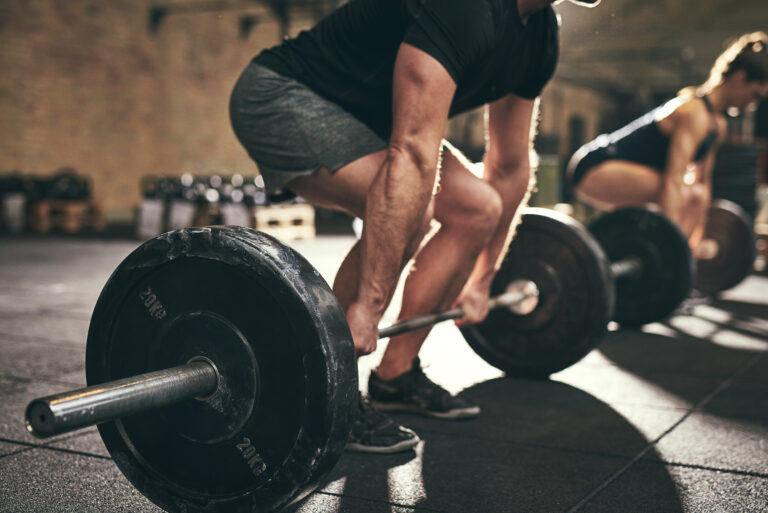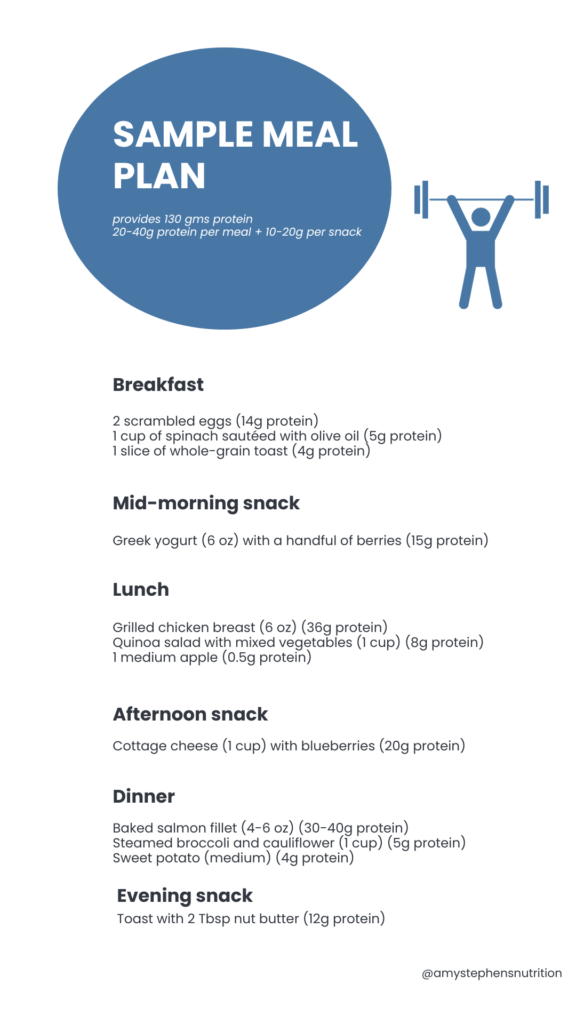Amy Stephens
MS, RDN, CSSD, CEDS
Licensed dietitian
specializing in sports nutrition
and eating disorders
MS, RDN, CSSD, CEDS
Licensed dietitian
specializing in sports nutrition
and eating disorders
Building muscle is a process that requires strategic nutritional and workout practices. Rather than focusing on losing body fat, focus on what you can do to increase muscle growth. Here are some helpful tips that can help you achieve your muscle-building goals more effectively.

1. Eat Enough Calories
You need to be in a calorie surplus to gain muscle. This means you need to consume more calories than your body burns throughout the day. It might be helpful to pack extra snacks to fill in gaps between meals. This ensures you consistently have the energy to fuel your workouts and promote muscle growth.
2. Eat Often, Every 3-4 Hours
In order to maximize muscle growth, it’s recommended to spread out your protein intake throughout the day. According to a study by Schoenfeld (2018), aim to eat three meals and a couple of snacks each day to reach your nutrition targets. This ensures your body always has the nutrients it needs to repair and build new muscle tissue.
3. Target 20-40 grams Protein per Meal
Protein is key to muscle growth. That’s about 3-5 oz of chicken, fish, turkey, 3 eggs, 6 oz of tofu, or a serving of Greek yogurt with nuts. Use a food-first approach and incorporate protein supplements only when reaching your targeted protein amount is not feasible. Aim for .2 grams protein per pound per meal and .1 per pound for snacks.
4. Eat Carbs & Protein After Workouts
After a workout, your muscles are primed to absorb nutrients. Include 20-40 grams of high-quality protein within the first hour after a workout to improve muscle growth and recovery. Additionally, carbohydrates replenish glycogen stores, further promoting recovery and growth. Aim for a 3:1 ratio of carbs to protein.
5. Take Recovery Days
Muscle growth happens outside the gym. In order to gain muscle, your body needs time to recover and repair damaged muscle tissue. Therefore, it’s crucial to schedule recovery days into your workout regimen.

Common Questions:
To grow muscle, do I need to use pre-workout protein drink?
Pre-workout drinks can give you an energy boost because many contain caffeine however, they aren’t necessary for muscle growth. The keys to growing muslce is a consistent workout regimen, proper nutrition, and adequate rest.
When is the best time of the day to eat to build muscle?
Eat high-quality protein within one hour of finishing a workout to maximize muscle growth. Then continue to eat every 3 hours to facilitate muscle recovery and growth. Remember that protein supplements are more effective when your calorie balance is correct.
I’m a runner, should I take creatine?
The American Pediatric Association does not recommend use for individuals under 18 years old. Creatine works by converting carnosine in muscle at a faster rate, resulting in increased muscle strength. For runners, creatine can aid in short, high-intensity sprints and lifts lasting 0-30 seconds. Currently, creatine is being studied for use with endurance athletes. For more information on creatine such as dosing, click here.
What protein supplements are the best?
When food isn’t readily accessible, such as at a gym, field or track, protein supplements are a convenient option to meet protein needs. Along with a balanced diet, protein supplements are a great way to fill in the gaps to reach protein targets. However, the “best” supplement varies based on individual needs, dietary restrictions, and preferences. Protein supplements derived from animal protein tend to be complete proteins. This means they contain all essential amino acids in which the body cannot make. Some examples are whey, casein, and egg. A great plant-based option that are also complete proteins are soy and pea protein.
Follow @amystephensnutrition for more tips on how to effectively build muscle and improve your athletic performance.
References
Schoenfeld, B.J., Aragon, A.A. (2018). How much protein can the body use in a single meal for muscle-building? Implications for daily protein distribution. J Int Soc Sports Nutr 15, 10.
Licensed Dietitian Specializing in sports nutrition and eating disorders
© Amy Stephens Nutrition
Website by Second Language